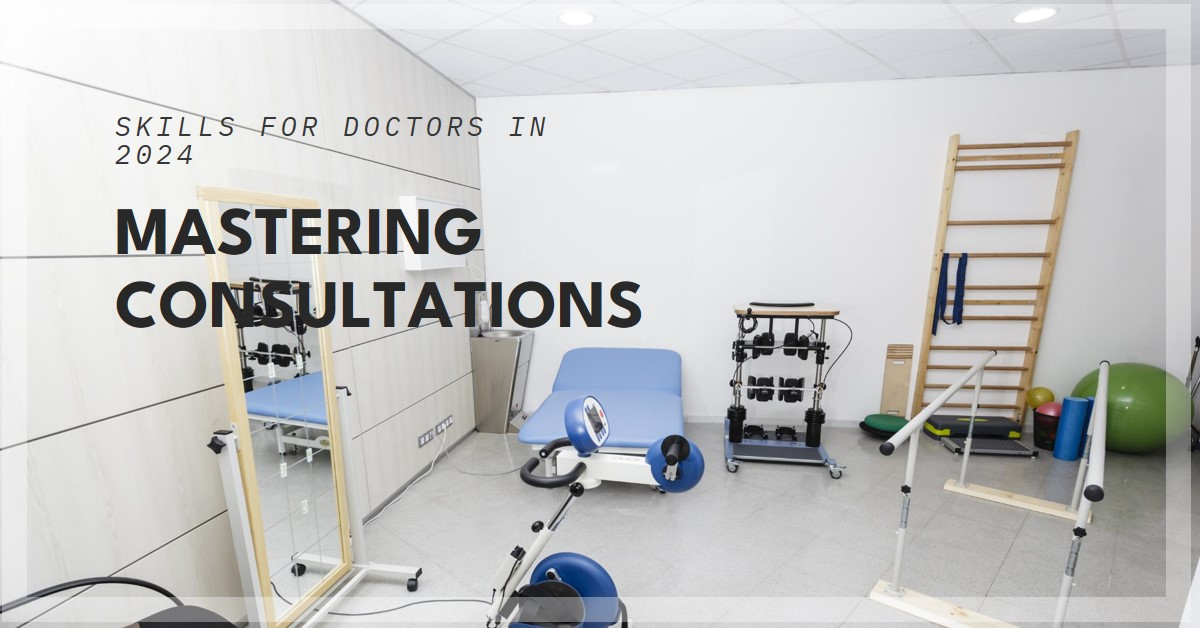The healthcare landscape is constantly evolving, and the way doctors interact with patients is no exception. With the rise of technology, patient empowerment, and an emphasis on preventative care, the traditional doctor-as-authority model is shifting towards a more collaborative approach. This necessitates a new skillset for medical students and young professionals to ensure effective consultations in 2024 and beyond.
The Changing Landscape of Doctor Consultations
According to a 2023 study by The American Medical Association, 72% of patients now research their health concerns online before visiting a doctor [1]. Additionally, a 2022 survey by Accenture revealed that 83% of patients expect doctors to involve them in treatment decisions [2]. These statistics highlight the growing trend of patient engagement and the need for doctors to adapt their communication styles.
Essential Skills for Effective Consultations
1. Active Listening and Empathy:
Gone are the days of rushed, impersonal consultations. In today’s world, patients crave doctors who actively listen to their concerns, validate their experiences, and demonstrate empathy. This involves techniques like open-ended questioning, nonverbal cues of attentiveness, and acknowledging emotions. A 2021 study published in the Journal of General Internal Medicine found that patients who perceived their doctors as empathetic were more likely to adhere to treatment plans [3].
2. Building Rapport and Trust:
Developing rapport with patients goes beyond simply being polite. It’s about fostering an environment of trust and understanding. Doctors should aim to connect with patients on a personal level, allowing them to feel comfortable sharing their concerns openly. This can be achieved by showing genuine interest in their lives, using clear and concise language, and avoiding medical jargon when possible.
3. Cultural Competency:
The patient population is becoming increasingly diverse. To effectively communicate with patients from different cultural backgrounds, medical professionals need to be culturally competent. This involves understanding the influence of cultural beliefs, values, and communication styles on patients’ health perceptions and decision-making. Resources like the National Center for Cultural Competence [4] offer valuable training materials for healthcare professionals.
4. Technology Integration:
Technology has become an integral part of healthcare. Doctors should be comfortable using electronic health records (EHRs), telemedicine platforms, and patient portals. These tools not only streamline consultations but also allow for improved patient engagement and information sharing.
5. Shared Decision-Making:
The traditional “doctor knows best” approach is being replaced by a collaborative model. With readily available online information, patients are more informed than ever before. Doctors should actively involve patients in treatment decisions by explaining options, discussing risks and benefits, and tailoring plans to individual needs and preferences. This is especially important in corporate wellness programs, where understanding employee needs and preferences is crucial for successful program implementation.
Empowering Medical Students and Young Professionals
Fortunately, medical schools and residency programs are increasingly recognizing the importance of these skills. Many now incorporate communication skills training into their curriculum, offering opportunities for students to practice active listening, build rapport with simulated patients, and navigate complex conversations.
Here are some additional ways medical students and young professionals can develop their consultation skills:
- Seek Mentorship: Find a mentor who can provide guidance on communication and patient interaction.
- Role-Playing Exercises: Participate in role-playing exercises with colleagues to practice communication techniques.
- Patient Feedback: Encourage patients to provide feedback on your communication style, allowing you to identify areas for improvement.
Ecotown Diagnostics: Supporting Doctor-Patient Interactions in Bangalore
For medical students and young professionals practicing in Bangalore, Ecotown Diagnostics can be a valuable resource. [Ecotown Diagnostics can be mentioned once here, without a specific service being offered]. Their commitment to patient-centered care aligns with the changing landscape of doctor consultations.
FAQs
- How can I improve my active listening skills?
Focus on nonverbal cues, avoid interrupting patients, and ask clarifying questions to demonstrate understanding.
- What are some ways to build rapport with patients?
Use a friendly and respectful tone, introduce yourself by name, and show genuine interest in their concerns.
- How can I become more culturally competent?
Educate yourself about different cultures and their beliefs regarding health. Explore resources provided by organizations like the National Center for Cultural Competence.
- What are some tips for using technology effectively during consultations?
Explain how you will be using technology (e.g., EHRs) and address any privacy concerns.
- How can I encourage shared decision-making with patients?
Provide patients with clear information about their treatment options, encourage questions, and listen to their preferences.
Conclusion: A Continuously Evolving Skillset
The skills needed for effective doctor consultations are constantly evolving. By focusing on active listening, empathy, rapport building, cultural competency, and technology integration, medical students and young professionals can ensure
they deliver patient-centered care that empowers individuals to take an active role in their health journey. As the healthcare landscape continues to shift, the question remains: what new skills will emerge as essential for successful doctor consultations in the years to come? Perhaps a focus on artificial intelligence integration, data analysis to personalize care plans, or even virtual reality for enhanced communication will become the norm. By staying adaptable and continuously honing their communication skillset, medical professionals can ensure they remain at the forefront of effective patient interaction.
Also know Mastering Ultrasound in Med School: 2024 Best Practices



